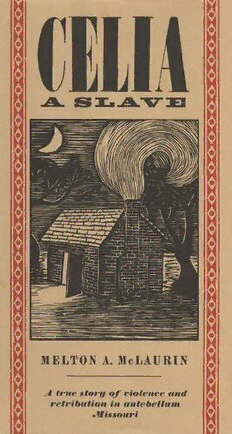
Celia, a Slave PDF
Preview Celia, a Slave
Celia, A Slave This page intentionally left blank CELIA A SLAVE MELTON A. McLATJRIN The University of Georgia Press Athens and London To Sandra in admiration of her courage and conviction © 1991 by the University of Georgia Press Athens, Georgia 30602 www.ugapress.org All rights reserved Designed by Barbara Henry Set in 10 on 12 Caledonia by Tseng Information Systems with hand-set display provided by Browne & Co., Stationers Printed digitally in the United States of America Library of Congress Cataloging-in-Publication Data LCCN Permalink: http://lccn.loc.gov/90023045 McLaurin, Melton Alonza. Celia, a slave / Melton A. McLaurin. xi, 148 p. ; 24 cm. isbn 0-8203-1352-1 (alk. paper) Includes bibliographical references (p. 137–143) and index. 1. Celia, d. 1855—Trials, litigation, etc. 2. Trials (Murder)—Missouri— Callaway County. 3. Slavery—Southern States. 4. Southern States— Moral conditions. I. Title. kf223.c43m34 1991 345.73'02523 347.3052523 20 90-23045 British Library Cataloging-in-Publication Data available Jacket design and illustration by Barbara Henry, Bowne & Co., Stationers, South Street Seaport Museum, New York ISBN for this electronic edition: 978-0-8203-4159-0 Contents Acknowledgments vii Introduction ix Chapter One 1 BEGINNINGS Chapter Two 14 THE CRIME Chapter Three 33 INQUISITION Chapter Four 53 BACKDROP Chapter Five 68 THE TRIAL Chapter Six 88 THE VERDICT Chapter Seven 104 FINAL DISPOSITION Chapter Eight 116 CONCLUSIONS Notes 123 Bibliography 137 Index 145 v This page intentionally left blank Acknowledgments As an academic discipline, history possesses an inherent ten- sion, one that every historian confronts. On the one hand, history is the study of the recorded past, of data, of facts. At times the record is dry and dull, at others, as with the case examined in this work, the record holds the power to captivate. History is also the search for the meaning of the recorded past, an interpretation of data, an exploration of the significance of facts. It is the effort to interpret, to ex- plain, that distinguishes the historian from the storyteller. Yet historians ignore their role as storytellers to their peril, if they wish to address an audience beyond the academy, to enter into a meaningful dialogue with the larger society. This work represents an attempt to resolve that tension, or at least to bring it to bear upon the effort to know and to understand a portion of the American past. Several col- leagues graciously offered advice about how to do this most effectively. Comments from Robert Hall of Northeastern University; Jacqueline Goggin of Clark University; Peter Stead of Swansea College, University of Wales; Gary Kremer of the Missouri State Archives; and Kathleen Berkeley of the University of North Carolina at Wilmington were especially helpful. So, too, were the comments of readers for the Uni- versity of Georgia Press. For the advice received, and for the time and energy devoted to reading the work in manuscript, I am truly grateful. VII This page intentionally left blank Introduction HE lives of public figures, those whom society comes I to regard as great men and women, are often used by historians and biographers to exemplify or define an issue or era from the past. In the mid-nineteenth century, for example, Elizabeth Cady Stanton came to represent the women's movement; Frederick Douglass and William Lloyd Garrison the abolitionists; Dorothea Dix reform in the treatment of the criminal and the insane; Edmund Ruffin and William Loundes Yancey a fierce south- ern nationalism based upon the defense and perpetuation of the institution of slavery. Yet the lives of lesser figures, men and women who lived and died in virtual anonymity, often better illustrate certain aspects of the major issues of a particular period than do the lives of those who, through significant achievement, the appeal of the orator, or the skill of the polemicist, achieve national prominence. Such is the case with the life of Celia, a slave who lived and died in Callaway County, Missouri. On October 9, 1855, Celia entered the circuit court of Callaway County, where she stood accused of murder. Approximately nineteen years of age and already the mother of two children, the accused was defended by a team of three lawyers. The most promi- nent of her defense attorneys was a popular figure in the county seat of Fulton, a man who had been three times elected to serve his constituents in the United States Con- gress. Celia's trial, its causes and consequences, confront us with the hard daily realities of slavery rather than with the abstract theories about the workings of that institution so IX
